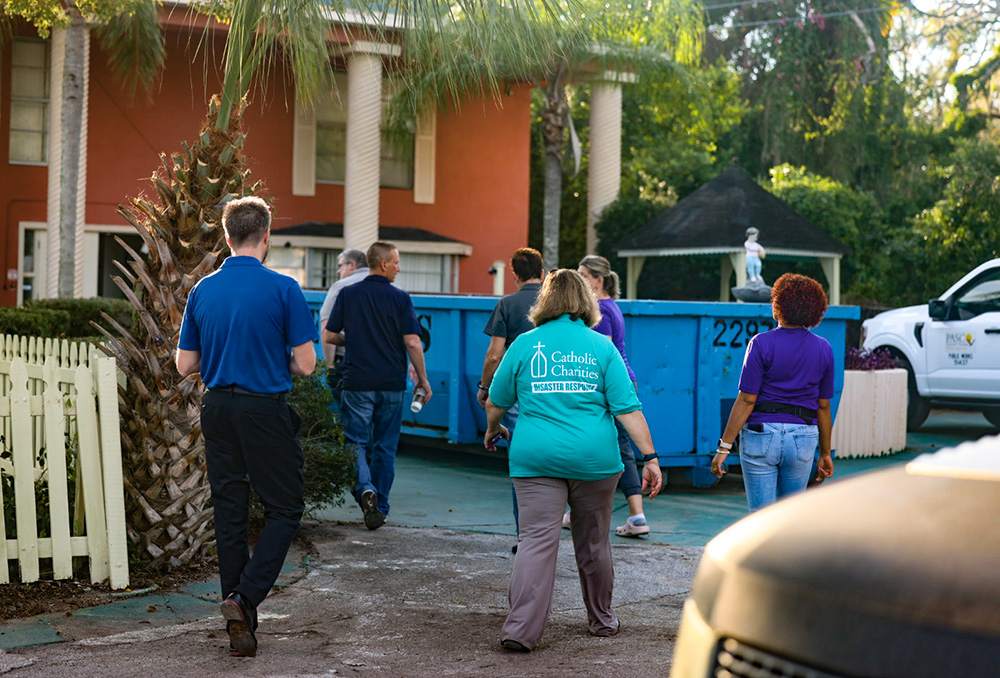
Kim Burgo, center, vice president of disaster operations at Catholic Charities USA, assesses damage in Florida with staff from Catholic Charities of the St. Petersburg Diocese in the aftermath of Hurricane Helene. (Courtesy of Catholic Charities USA/Jeremy Mines)
Two days after Hurricane Helene barreled into the United States, a local sheriff in an isolated Tennessee town contacted Kim Burgo, Catholic Charities USA vice president for disaster operations.
"He was almost in tears," Burgo recalled. "He said, 'I've got no water in the town. I can't get ahold of anybody at the state or in the county or at FEMA. Can you help me?'
"We sent them two truckloads of water very quickly to get that immediate need taken care of. I also made calls at the state and federal level to make sure they were on the radar to get the help they needed."
The ongoing recovery across the South from Hurricanes Helene and Milton, powerful storms that struck back to back in early autumn, are among 177 open disasters nationwide that Catholic Charities is addressing as of Oct. 20.
The agency defines disasters as an event that's gone beyond the capacity of the local community to take care of itself. Disasters can be localized and hardly garner any media attention, or be widespread, such as the one-two punch of Helena and Milton that wreaked devastation across Florida, North Carolina, Georgia, South Carolina, Virginia and Tennessee.
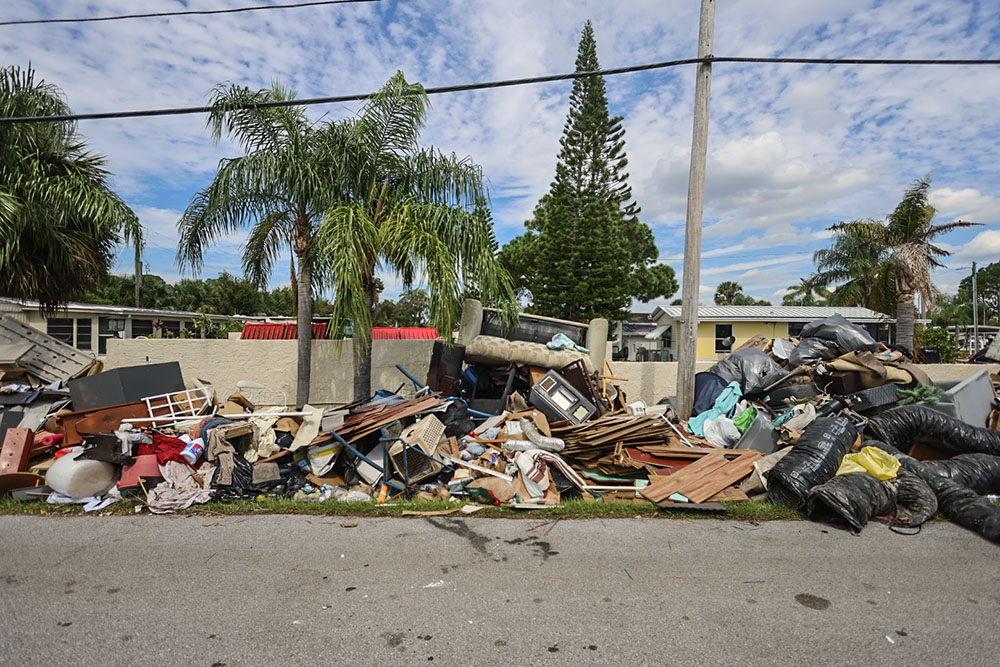
Destruction in the Diocese of St. Petersburg, Florida, following Hurricane Helene. The hurricane jumped from 80 mph winds to 140 mph winds in less than 36 hours. (Courtesy of Catholic Charities USA/Jeremy Mines)
"I've been to those areas," Burgo said. "For the affected people, it's an absolute catastrophe right now."
As rising temperatures driven mainly by human activities have fueled more extreme storms and weather-related disasters, Catholic Charities is responding to an increasing number of climate-related incidents, she said.
"There used to be seasons — a hurricane season, a tornado season, a wildfire season," Burgo told EarthBeat. "Because of the changes in our climate, the seasons almost no longer exist. We see tornadoes in December and wildfires in February."
In the case of hurricanes, hotter ocean waters due to climate change has been connected to more tropical storms undergoing rapid intensification, where wind speeds increase at least 35 mph in a 24-hour period. Helene jumped from 80 mph winds to 140 mph winds in less than 36 hours, while Milton's winds accelerated in a day from 85 mph to 175 mph — becoming a Category 5 storm before making landfall as a still-dangerous Category 3 storm.
While some people may be more inclined to wait out lesser storms, faster amplification leaves less time for critical decisions, Burgo said.
"When it gets up to a [Category] 4 or 5, they have to get out of Dodge," she said. "The problem is by the time it gets to that point, they have lost an opportunity to evacuate, so more people end up in vulnerable situations because they are being notified in the last minute and there is no place to go. So it becomes very dangerous when we see these kinds of climate change incidents occur."
Deploying with a plan
After disasters like the recent hurricanes, the immediate focus for Catholic Charities is on providing items essential for survival, including food, water, shelter and safety.
"We want to make sure people have access to food. We want to ensure they're in some sort of housing situation with friends or neighbors, or if they need to be put up in a hotel or temporary shelter," Burgo said. "They may need hygiene kits or medically necessary food, such as for diabetics."
Advertisement
In a widespread disaster like ones brought on by hurricanes, determining where and when to deploy and what is needed takes some investigation, Burgo noted. Some responses call for setting up distribution sites; others require mobile teams.
With the local Catholic Charities office potentially experiencing the effects of the disaster, such as power outages and flooding, the national office monitors local media reports for immediate information to determine the area of greatest need, which changes over time.
For Catholic Charities, deployments typically begin with Burgo or a small team to assess the needs. They review factors like available lodging, as hotels may be booked by evacuees and other aid groups.
"We don't just hop on a plane and rush in like disaster cowboys here to save people. That causes more chaos," she said.
"We wait to be invited to come in," she added. "Then we work with all local entities to determine what other kinds of deployments have to take place in order to meet community needs."
Disaster response is an actual profession, Burgo notes. Of Catholic Charities' 65,000 staff members nationwide, the organization has a cadre of people trained, certified and accredited to do disaster work when called.
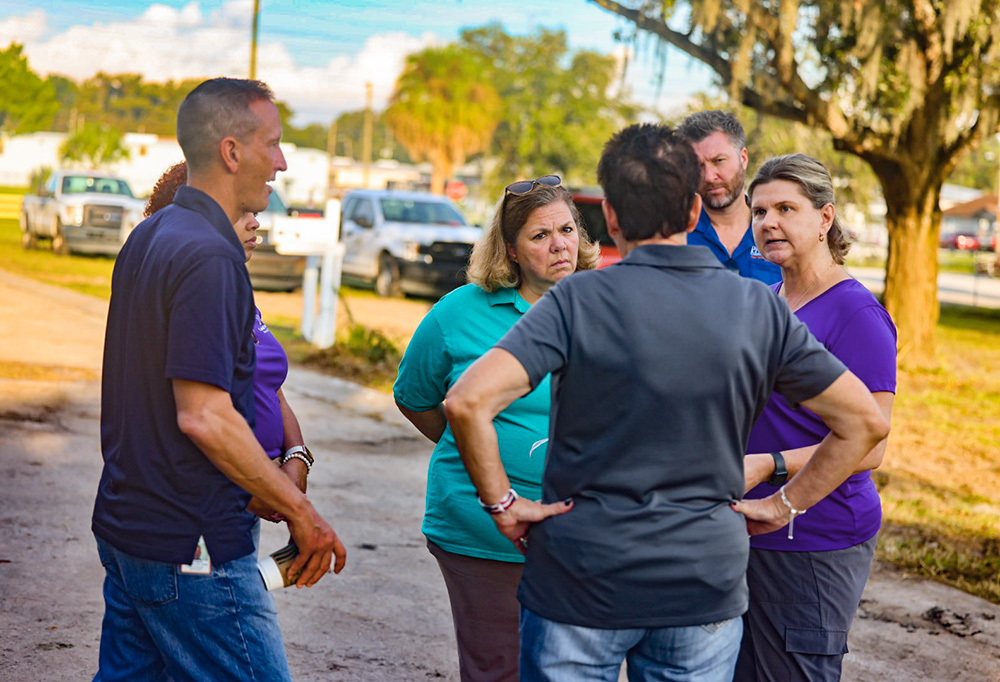
Kim Burgo, center, assesses damage in Florida with staff from Catholic Charities of the St. Petersburg Diocese in the aftermath of Hurricane Helene. (Courtesy of Catholic Charities USA/Jeremy Mines)
In Ohio, Mercy Health's medical system has a team connected to Catholic Charities of Toledo that deploys to places struck by disasters. In Hurricane Milton's aftermath, Burgo connected with them at a Tampa, Florida, distribution site where they were providing wellness checks for people who couldn't get in touch with their doctor.
Names of potential volunteers are provided to local Catholic Charities agencies, where each diocese has its own guidelines for training, background checks and fingerprinting.
For Burgo, some of the most striking examples of the impacts of the recent hurricanes are within local Catholic Charity staff who help people but often are not spared by disasters when they hit.
"Sometimes their roofs are ripped off. Trees have fallen on their homes. Their houses have flooded," the longtime disaster response coordinator said. "But yet they find the fortitude within themselves to say, 'I'll take care of that later. I really need to also take care of the people I care for on a daily basis.' They're my heroes as they try to navigate their own disaster recovery but also work simultaneously to help the community to bounce back."
It's important for staff members to avoid compassion fatigue, she added.
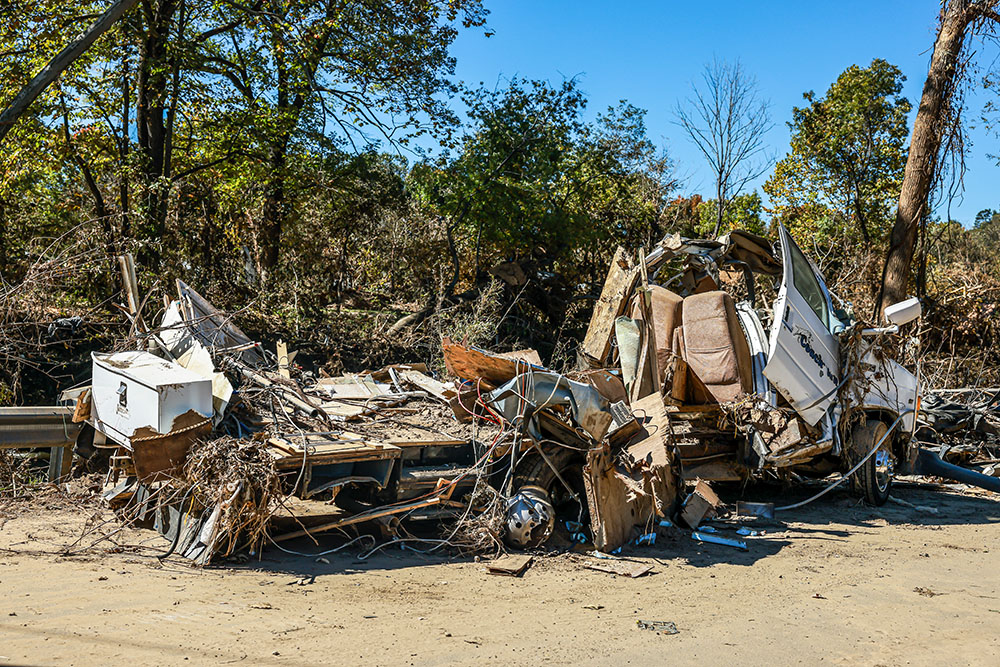
Destruction in Asheville, North Carolina, following Hurricane Helene. "For the affected people, it's an absolute catastrophe right now," says Kim Burgo, vice president of disaster operations at Catholic Charities USA. (Courtesy of Catholic Charities USA/Jeremy Mines)
"We understand from being in the business that we're not going to get a week off — or maybe even a day — for a long time," Burgo said. "But it's taking moments of self-care, whether that's turning off your phone for a couple hours, talking with somebody, taking a walk and not overwhelming yourself with what's going on. If you don't, it can creep up on you."
Dignity amid disaster
In the wake of the recent hurricanes, Catholic Charities USA has provided blankets and solar lights in addition to other goods and services.
In some cases, partner organizations donate items like hygiene kits, but more often, the supplies have to be purchased from companies outside the disaster zone. That can pose challenges, Burgo said, as states have varying rules and requirements about trucking in disaster supplies.
Many disaster organizations, including Catholic Charities, are part of the National Voluntary Organizations Active in Disaster (NVOAD), which serves as an umbrella organization for coordinated relief efforts.
"We have the mindset that there is not one organization out there — not FEMA, not the American Red Cross, not Catholic Charities — that has the ability to meet all the needs of the community when a disaster hits," said Burgo, who is on the NVOAD board of directors. "We spend a lot of time on sunny days getting together, building relationships and having plans in place so that at the time of a disaster, we just activate those plans."
"We're very much in conversation with them all the time, so we all know what's going on before the disaster," she added.
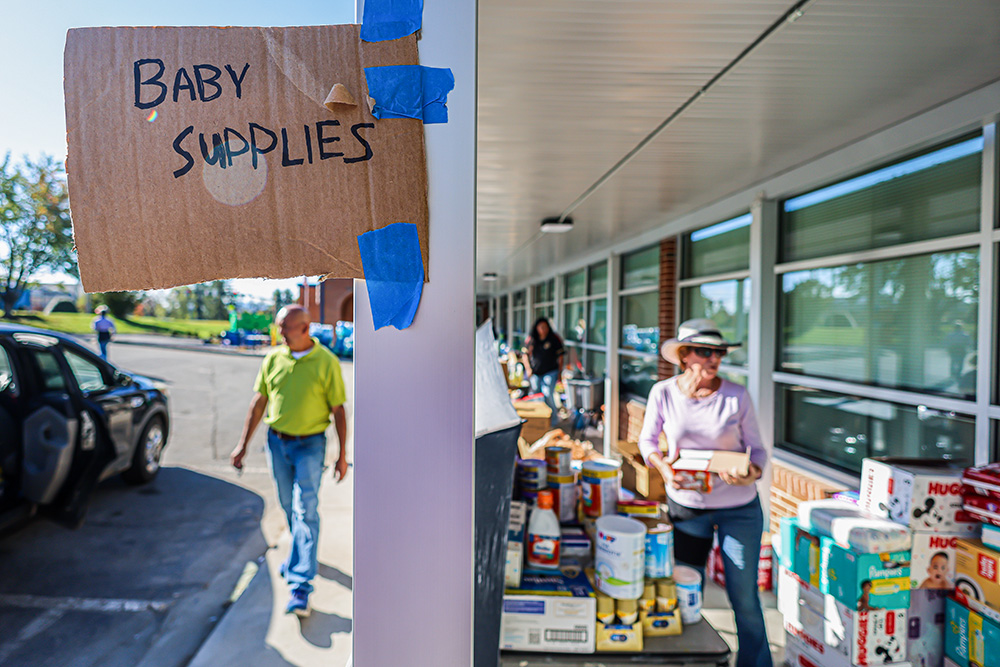
A Catholic Charities distribution center in the Diocese of Charlotte, North Carolina, following Hurricane Helene. Catholic Charities views procuring supplies and services in the wake of a disaster as an expression of the church teaching guiding its work. (Courtesy of Catholic Charities USA/Jeremy Mines)
After a disaster strikes, identifying what items are needed immediately is a top priority for Catholic Charities USA. With wildfires, that means rakes, shovels and bins to salvage what's left of a person's property. With hurricanes, it's "clean out" and "clean up" supplies.
For people looking to assist impacted communities, Burgo said the best help is financial help. Making a donation or sending gift cards is better than shipping unwanted items from your closet, she added. "We really want to be able to purchase things at the local level wherever we can so we can get the local economy going."
Catholic Charities USA has set up a relief fund for victims of Hurricanes Helene and Milton that as of Oct. 21 has distributed more than $2 million to 11 chapter agencies in affected areas. All raised funds are directed to disaster responses, Catholic Charities said. Donations can be made through www.catholiccharitiesusa.org or by texting 'Milton' to 20406.
Catholic Charities views procuring supplies and services as an expression of the church teaching guiding its work. Its disaster response also encompasses spiritual assistance, which is often provided by onsite priests. A team of eucharistic ministers helps access the homebound to ensure their safety and provide needed services. The agency is also viewed as a leader within NVOAD in providing crisis counseling or mental health counseling, Burgo said.
"We want to be able to provide people the dignity and respect that they deserve when they're at their lowest point in life," she said.







